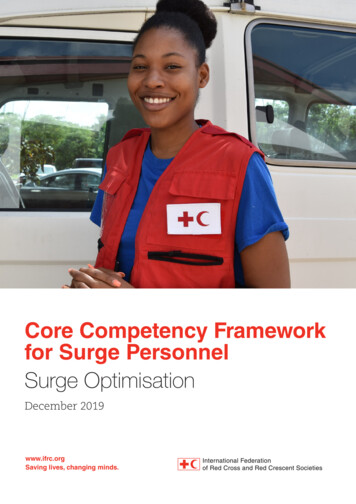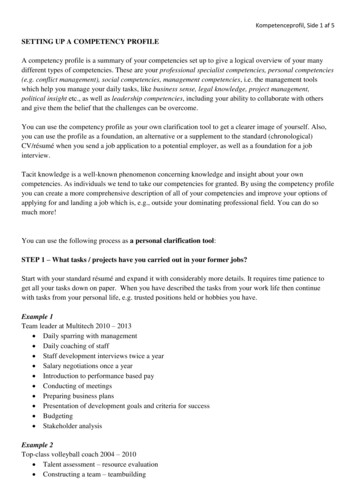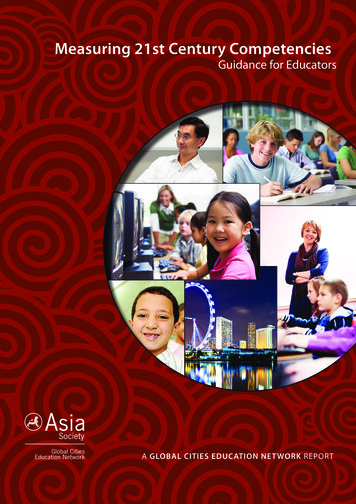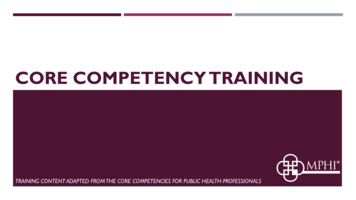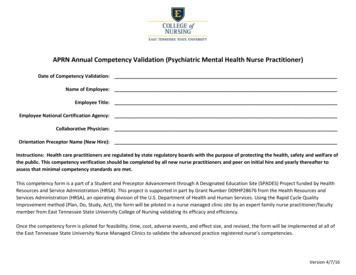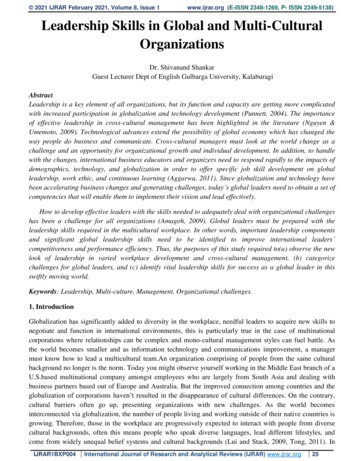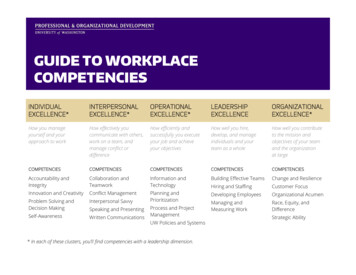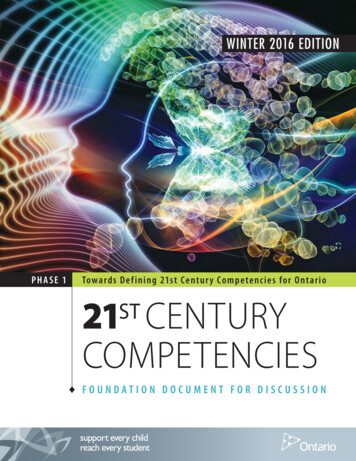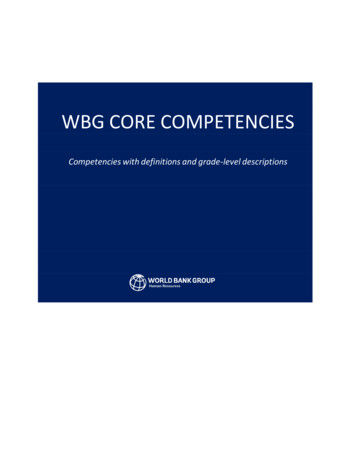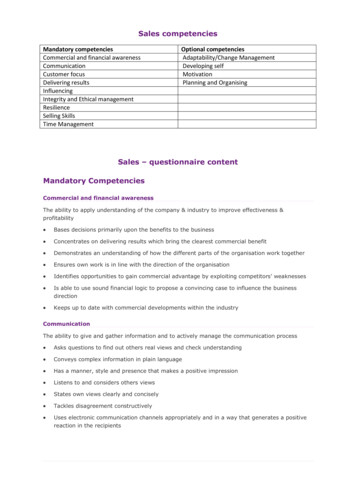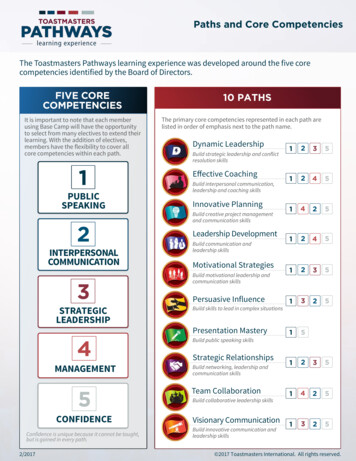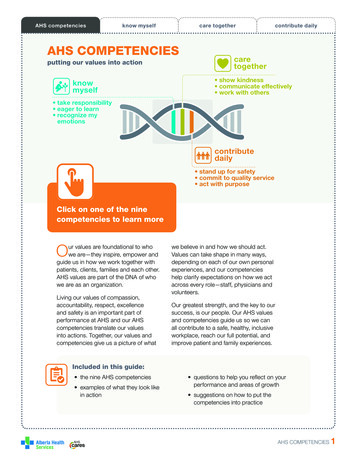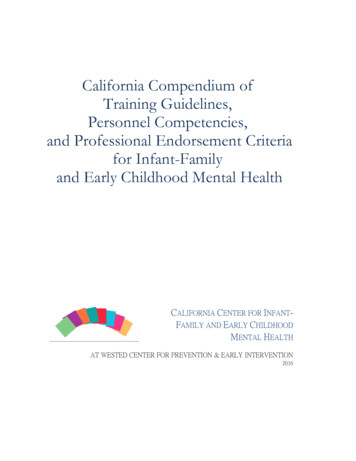
Transcription
!!!California Compendium ofTraining Guidelines,Personnel Competencies,and Professional Endorsement Criteriafor Infant-Familyand Early Childhood Mental Health!!!!!!!!!!!!!!!!!!!!!!
!!!!!!!!!!!!California Compendium of Training Guidelines, Personnel Competencies, andProfessional Endorsement Criteria for Infant-Family and Early Childhood MentalHealth was produced by the California Center for Infant-Family and Early ChildhoodMental Health at WestEd Center for Prevention & Early Intervention.For more information about infant-family and early childhood mental health or todownload copies of this Compendium, please visit www.cacenter-ecmh.org, or emailinfo@cacenter-ecmh.org.California Center for Infant-Family and Early Childhood Mental Healthat WestEd Center for Prevention & Early Intervention1000 G Street, Suite 500Sacramento, CA 95814(916) 492-4000www.cacenter-ecmh.orgPlease cite this document as follows: California Center for Infant-Family and EarlyChildhood Mental Health. (2016). California Compendium of Training Guidelines,Personnel Competencies, and Professional Endorsement Criteria for Infant-Family andEarly Childhood Mental Health. Sacramento: WestEd. 2016 WestEd.
!Table of ors,*and*Field*Reviewers*1992-2016*.*47!California Compendium of Training Guidelines, Personnel Competencies, and Professional Endorsement Criteriafor Infant-Family and Early Childhood Mental Healthii
!California Compendium of Training Guidelines, Personnel Competencies, and Professional Endorsement Criteriafor Infant-Family and Early Childhood Mental Healthiii
!!Introduction toInfant-Family and Early Childhood Mental HealthThe field of infant-family and early childhood mental health is a broad-based,interdisciplinary field of study, research, and practice that focuses on the social andemotional development and well-being of infants and young children within the context oftheir early relationships, family, community, and culture.Developments in neuroscience, infant mental health, and attachment, as well as prenataland perinatal psychology and health, indicate that the optimal time to make positiveinterventions in human development is from the very beginning of life. Researchdemonstrates that many life-enhancing or life-diminishing patterns, including health orchronic disease, self-regulation, and attachment issues, originate in the prenatal andperinatal periods. The best outcomes occur when families are supported in their mental andphysical well-being throughout pregnancy, birth, infancy, and early childhood.Infant-family and early childhood mental health services emphasize the importance of earlycaregiving relationships on brain development, attachment, and the regulation of emotionsand behavior. Early infant mental health services can mitigate effects of risk and stress andhelp families develop buffers to reduce early adversity. Early caregiving relationshipsprovide the emotional foundations for the development of resiliency and self-esteem.Through early attachments and interactions, children develop trust and security or learn tomistrust and protect themselves against the insecurity of their world. A strong emotionaland social foundation is also an essential component of school readiness and overall healthand development. Early mental health services promote healthy development bystrengthening foundational early relationships, family functioning, the young child’semotional regulation, and social competence. Relationships that support a child’s ability tocope, learn, and adapt to stressors and new environmental demands build resilience and arekey to lifelong health and well-being.To offer effective intervention and support, each provider of service interacting withinfants, young children, and their families must understand the basic concepts ofdevelopment and mental health principles of infants and young children. Providers have anequally important professional role to support families in their ability to protect, nurture,and guide their children.Experts in the field of mental health, and particularly infant-family and early childhoodmental health, have endeavored for some years to articulate the specialized course workand skills to build providers’ skills and competencies that qualify them as adept indelivering services to infants and young children within the context of their families.The purpose of the 2016 California Compendium of Training Guidelines, PersonnelCompetencies, and Professional Endorsement Criteria for Infant-Family and EarlyChildhood Mental Health (Compendium) is to articulate the knowledge, skills andCalifornia Compendium of Training Guidelines, Personnel Competencies, and Professional Endorsement Criteriafor Infant-Family and Early Childhood Mental Health!Page 1
!!experience necessary to work effectively in the field of infant-family and early childhoodmental health, and to introduce a process of professional endorsement to indicate anindividual’s level of competence attained in the field.BACKGROUND OF EFFORTS IN CALIFORNIADuring the last two decades, professionals in California and throughout the country haveworked to clarify the knowledge, skills, and competencies needed to provide effectiveinfant-family and early childhood mental health services. In California, an initial set ofrecommendations and personnel competencies was identified in 1996 through a leadershiptraining grant funded by the U.S. Department of Health and Human Services, Maternal andChild Health Bureau, under the direction of the University of Southern CaliforniaUniversity Center for Excellence in Developmental Disabilities at Children’s Hospital LosAngeles.Based on these initial recommendations, a state workgroup was established in 2001 inassociation with California’s Infant, Preschool and Family Mental Health Initiative. Thisstatewide special project, funded by the First 5 California Children and FamiliesCommission through the Department of Mental Health, and coordinated by WestEd Centerfor Prevention & Early Intervention (CPEI) in partnership with eight county teams,provided a new venue and renewed interest in personnel competencies and staffdevelopment in the field of infant-family and early childhood mental health.The 2001–2003 interdisciplinary workgroup included representatives from AlliantInternational University, the California Department of Health Services (now called theCalifornia Department of Health Care Services), the California Department of MentalHealth, Children’s Hospital & Research Center at Oakland, the University of SouthernCalifornia University Affiliated Program at Children’s Hospital, Los Angeles, and WestEdCPEI. The workgroup reviewed materials and recommendations from other states,consulted with field leaders, and gathered information from organizations to address theneed for training guidelines and personnel competencies in the interdisciplinary field ofstudy, research, and clinical practice. In 2003, the workgroup developed training guidelinesthat were published and disseminated through the California Early Intervention TechnicalAssistance Network (CEITAN) 1 at WestEd.A second 2007–2009 interdisciplinary workgroup was comprised of infant-family and earlychildhood leaders who were engaged in training throughout California based on the 2003training guidelines and/or worked with service providers from multiple disciplines andsystems of care. The workgroup also included representatives from the CaliforniaDepartment of Mental Health, CEITAN, and the Infant Development Association ofCalifornia. Based on practice and more recent literature reviews, a revised draft of thetraining guidelines was sent to infant and early childhood mental health professionalsthroughout the country for !!!!!!!!!!!!!!!!!!!!!1CEITAN is a project of the WestEd Center for Prevention & Early Intervention.California Compendium of Training Guidelines, Personnel Competencies, and Professional Endorsement Criteriafor Infant-Family and Early Childhood Mental Health!Page 2
!!This Compendium represents the next generation of practice and research. This refined set ofskills and competencies embodies the expertise an individual needs to work with infants, youngchildren, and their families and provides a framework for developing academic training and otherpersonnel preparation in infant-family and early childhood mental health.PRACTICE OF PROVIDING EARLY MENTAL HEALTH SERVICESThe guidelines in this document promote the belief that early mental health servicesprovided to infants, young children, and their families must extend across a continuum ofpromotion, preventive intervention, and treatment services, starting even before birth. Thiscontinuum requires that the community provide a variety of services to support infant andearly childhood mental health.! !Promotion: These services and supports recognize the central importance of earlyrelationships on brain development, learning, and the emotional and social well-being of allyoung children. Services include a focus on positive early caregiving relationships an dg u i da nce within the home, child development settings, and other service settings foryoung children and their families. ! Preventive a n d E a r l y Intervention: These services and supports buffer effects of riskand stress and address potential early relationship challenges or vulnerabilities that have adocumented impact on early development. Specific intervention strategies are designed tonurture mutually satisfying family-child and other caregiving relationships and preventthe progression of further difficulties. Health and developmental vulnerabilities, parentingdifficulties, domestic violence, family discord, and other major child and family stressorsmay warrant the delivery of preventive intervention services in a variety of settings. ! Treatment: These services and supports target children and their families in distressor with clear symptoms indicating a mental health disorder. The services addressattachment and relationship problems and the interplay between the child and significantcaregivers that jeopardize achieving optimal early mental health and early emotional andsocial development outcomes. Specialized early mental health treatment services mayfocus on caregiver-child dyads or other relationships and are designed to improve childand family functioning and the mental health of the child, the parents, and other caregivers.Across this continuum, infant-family and early childhood mental health services seek tofacilitate a child’s biological, neurological, social, and emotional development whilefocusing on early relationships and the “goodness of fit” among the child, the parents, andother significant caregivers.!!California Compendium of Training Guidelines, Personnel Competencies, and Professional Endorsement Criteriafor Infant-Family and Early Childhood Mental Health!Page 3
!!!KEY TERMS AND CONCEPTSThe following definitions provide the reader with a unified understanding of words andphrases used in this Compendium.caregiver: anyone included in the definition of parent as well as any individual who isproviding caregiving for an infant or young child, such as early care and educationproviders, preschool educators, and nannies.direct service: those interactions determined by the provider’s scope of practice, in whichthe provider interacts directly with the child, family, and other caregivers/providers.family: the primary caregivers and others who assume major long-term roles in an infant’sor toddler's daily life. 2infant-family and early childhood mental health (IFECMH): social and emotionaldevelopment of infants and young children within the context of family well-being,biology, relationships, culture, and environmental conditions. The field of IFECMH is abroad-based, transdisciplinary field of study, research, and practice focused on enhancingoverall development, social and emotional well-being, and relational health.parent: a biological or adoptive parent; a person acting in place of a parent such as agrandparent, second parent, or step-parent with whom the child lives or whom the childregards as a parent; or a person who is legally responsible for the child’s welfare.provider: a trained individual who interacts directly with infants, young children, and theirfamilies to deliver family-centered, diversity-informed, developmentally appropriateservices and supports across the continuum of infant-family and early childhood mentalhealth within their scopes of practice, training, and codes of ethics. In addition to specifictraining and experience in infant-family and early childhood mental health, a provider’sbackground might include a degree, license, credential, and/or training in audiology,counseling, early intervention, human development, medicine, nursing, occupationaltherapy, physical therapy, psychology, social work, special education, speech and languagepathology, and/or other related fields.reflective practice: a continuous process of deliberate self-observation and analysis ofexperiences, thoughts, and feelings in the context of one’s work to better understand one’sown actions and the reactions those actions prompt in oneself and others, potentiallyresulting in developmental insight, a refocus of thinking, generation of new ideas, andmodifications of actions, behavior, treatment, and learning — with a goal of improvingone’s professional !!!!!!!!!!!!!!!!!!!!2Title 17, California Code of Regulations (CCR), Chapter 2, Section 52000 (b)(15).California Compendium of Training Guidelines, Personnel Competencies, and Professional Endorsement Criteriafor Infant-Family and Early Childhood Mental Health!Page 4
!!reflective practice facilitation: an individual or small group integrative experience thatsupports the provider to reflect on his or her work. This includes: ! identifying the experiences, thoughts, and feelings involved in doing this work; ! considering the interplay of diversity issues including race, power, and privilege as theseaffect the provider and the families served; ! exploring ways to apply relevant theories and knowledge bases to clinical situations; ! upholding an appreciation of the importance of relationships at the core of infant-family andearly childhood mental health; ! exploring possible approaches to working effectively with all infants and families.!scope of practice: the procedures, actions, and processes that providers are permitted toundertake in keeping with the terms of their professional license, credential, orcertification. The scope of practice is limited to that which the law allows for specificeducation and experience and specific demonstrated competency. Each jurisdiction haslaws, licensing bodies, and regulations that describe requirements for education andtraining and define scope of practice.!!!California Compendium of Training Guidelines, Personnel Competencies, and Professional Endorsement Criteriafor Infant-Family and Early Childhood Mental Health!Page 5
alifornia Compendium of Training Guidelines, Personnel Competencies, and Professional Endorsement Criteriafor Infant-Family and Early Childhood Mental Health!Page 6
!!Professional Endorsement: Defining a Standard of ExcellenceAll professionals working with young children and their families need to be grounded inthe core knowledge and training necessary to provide family-centered, diversity-informed,and developmentally appropriate services across the continuum of infant-family and earlychildhood mental health. The endorsement process described in this section identifies howa service provider might achieve competency in the field of infant-family and earlychildhood mental health. The process offers guidance for obtaining the knowledge andskills that will result in a better-trained and more effective workforce capable of providingenhanced services for infants, young children, and their families, as well as guidance forappropriate supervision by qualified personnel. Endorsement also establishes a standard ofexcellence against which professionals can evaluate their training and experience,employers can assess the expertise of an applicant, and consumers can make decisionsabout providers of services to their children and families.A provider can seek endorsement in the following categories, depending upon her or hiscurrent training, experience, and professional goals: ! Transdisciplinary Infant-Family and Early Childhood Mental Health Practitioners(Transdisciplinary IFECMH Practitioners) include highly skilled providers with abachelor’s degree or higher who are endorsed by the California Center for Infant-Familyand Early Childhood Mental Health, having met the Transdisciplinary IFECMHPractitioner criteria described in this Compendium. Transdisciplinary IFECMHPractitioners provide direct services in their specialty to pregnant women, infants, toddlers,preschoolers, and their families — infusing infant-family and early childhood mentalhealth principles and practices within their scope of practice and professional ethics. TheTransdisciplinary IFECMH Practitioners typically have the most frequent contact withinfants, very young children, and their families; provide services in the areas of promotion,preventive intervention, and treatment; and partner with and make referrals to IFECMHSpecialists. Individuals may have a professional license or credential in a field related toinfant-family and early childhood mental health and early intervention services. ! Advanced Transdisciplinary Infant-Family and Early Childhood Mental HealthPractitioners are individuals with a master’s degree or higher in a relevant field who areendorsed by the California Center for Infant-Family and Early Childhood Mental Health,having met the criteria for the Transdisciplinary IFECMH Practitioner. AdvancedTransdisciplinary IFECMH Practitioners have a minimum of eight years of directexperience with infants and young children, prenatal up to age 5. ! Infant-Family and Early Childhood Mental Health Specialists (IFECMHSpecialists) include providers with a master’s degree or higher who are endorsed bythe California Center for Infant-Family and Early Childhood Mental Health, havingmet the IFECMH Specialist criteria. IFECMH Specialists are from relevantprofessional practice disciplines and they provide prenatal, infant-family, and earlychildhood mental health services within their scope of practice and professionalCalifornia Compendium of Training Guidelines, Personnel Competencies, and Professional Endorsement Criteriafor Infant-Family and Early Childhood Mental Health!Page 7
!!ethics in the areas of promotion, preventive and early intervention, and treatment.Individuals also have a professional license or credential from a state regulatoryagency. ! Reflective Practice Facilitators I and II (RPF I and II) are individuals endorsed bythe California Center for Infant-Family and Early Childhood Mental Health whosupport the reflective practice of providers working with infants, toddlers, youngchildren, and their families and who have completed an additional set of trainingsand competencies focusing on the reflective practice facilitation process as outlinedin this Compendium. Reflective Practice Facilitator I must first be endorsed as aTransdisciplinary Mental Health Practitioner, Advanced Transdisciplinary MentalHealth Practitioner or Mental Health Specialist. Reflective Practice Facilitator IImust currently be endorsed as a Mental Health Specialist. RPFs I provide reflectivepractice facilitation for Transdisciplinary Mental Health Practitioners and AdvancedTransdisciplinary Mental Health Practitioners. RPFs II can provide reflectivepractice facilitation for either Transdisciplinary Mental Health Practitioners orMental Health Specialists, depending on their cross discipline experience. ReflectivePractice Facilitators play many roles in communities and programs. Many impartreflective practice skills as clinical or reflective supervisors infusing these skills toaddress both the relational dynamics of direct service delivery and relatedadministrative issues. Some are in supportive roles preparing staff to workeffectively with families. It is widely acknowledged that the dynamics of thereflective practice facilitation relationship will in turn influence provider/familyrelationships; thus, the Reflective Practice Facilitator must embody ways of beingthat are considered best practice for infant-family and early childhood mental healthproviders across systems. ! Reflective Practice Mentors (RP Mentors) are individuals endorsed by theCalifornia Center for Infant-Family and Early Childhood Mental Health whohave attained endorsement as a Reflective Practice Facilitator I or II and have alsomet the requirements to be able to train, support, and facilitate the learning of othersundertaking the work of reflective practice facilitation. Activities of a mentorinclude but are not limited to program development, evaluation, supervision,training, staff development, policy development, research, and work within andacross systems of care serving young children and families. Endorsement for theReflective Practice Mentor requires additional hours focused specifically ondeveloping reflective facilitation skills.The process for pursuing endorsement involves gathering a portfolio of materials. Theportfolio must document learning experience in specific areas of knowledge, verify directservice provided to children and families, and identify direct service supported byreflective practice facilitation. The applicant submits the portfolio along with anapplication for review by the California Center’s endorsement board. The process isoutlined in detail at the end of this section.The Compendium also provides matrices, organized by endorsement category, that identifyCalifornia Compendium of Training Guidelines, Personnel Competencies, and Professional Endorsement Criteriafor Infant-Family and Early Childhood Mental Health!Page 8
!!the knowledge and training necessary to work with very young children and their families— with a focus on early relationships and early mental health. The matrices provide aframework to guide professionals seeking specialized training in infant-family and earlychildhood mental health. They also guide the development of both university-basedacademic coursework and comprehensive infant-family and early childhood mental healthtraining programs, as well as applied workshops through continuing education, in-servicetraining, and direct service settings.TRAINING AND ENDORSEMENT SPECIFICSEach matrix includes two domains of content: Domain 1, the Knowledge domain, includeskey concepts and competencies providers need in various aspects of the infant mentalhealth field. Domain 2, Direct Service Experience Supported by Reflective PracticeFacilitation, delineates specifics related to face-to-face service provision, supported byreflective practice, considered to constitute professional accomplishment.The lists in the matrices provide an overview of critical core material; they are notintended to be exhaustive or to specify objectives of individual training curricula.ENDORSEMENT AS A TRANSDISCIPLINARY IFECMH PRACTITIONER OR IFECMH SPECIALISTApplicants for endorsement as either Transdisciplinary IFECMH Practitioners or IFECMHSpecialists must choose an age group specialization with which to work: ! Infants and children from prenatal up to age 3 (prenatal through 35 months) andtheir families ! Children ages 3 up to 5 (36 through 59 months) and their families ! Infants and children from prenatal up to age 5 (prenatal through 59 months) andtheir familiesTraining for the Transdisciplinary IFECMH Practitioner focuses on providing an overviewand application of the core concepts within each broad domain of knowledge.Training for IFECMH Specialists focuses on using basic understanding of core infantmental health concepts as a building block for in-depth assessment and intervention, withthe goal of developing appropriate interventions to enhance all services designed to meetindividual child and family needs.Training for Reflective Practice Facilitators I and II involves both curriculum-based andintegrative experience-based learning components, including training in reflective practicefacilitation.Reflective Practice Mentors have additional training and requirements beyond thoserequired of Reflective Practice Facilitators I and II, as indicated in later sections in thisCompendium.!!California Compendium of Training Guidelines, Personnel Competencies, and Professional Endorsement Criteriafor Infant-Family and Early Childhood Mental Health!Page 9
!!!ENDORSEMENT AS A REFLECTIVE PRACTICE FACILITATORApplicants for Reflective Practice Facilitator I or II who have been endorsed as aTransdisciplinary IFECMH Practitioner, an Advanced Transdisciplinary IFECMHPractitioner, or an IFECMH Specialist need at least one letter of recommendation from anindividual who provided reflective practice facilitation and mentorship during the years theapplicant provided reflective practice to others. Applicants must also provide the namesand contact information of three individuals for whom they facilitated reflective practice. ACalifornia Center endorsement panel will contact the references to verify the length of timeand quality of the reflective practice facilitation. Letters of recommendation for theReflective Practice Facilitator should be from a different individual than those who wrotereferences for the applicant for Transdisciplinary IFECMH Practitioner or IFECMHSpecialist. The application requests verification that criteria for the Reflective PracticeFacilitator were met, including training, readings, video viewing, and hours mentored.ENDORSEMENT AS A REFLECTIVE PRACTICE MENTORApplicants for Reflective Practice Mentor must previously have met criteria for RPF I or IIendorsement. They must submit a short personal statement regarding their qualifications asa mentor, the names of three Reflective Practice Facilitators they mentored, and at leastone letter of recommendation from a professional who provided mentorship to the applicantas they became a mentor. Applicants must also submit a video of a reflective practicefacilitation mentoring session and reflective narrative.ENDORSEMENT SUBMISSION AND PROCESSINGEndorsement primarily requires applicants to gather supporting documentation of theirtraining and experience and to complete and submit an application. Specifics are availableon the California Center’s website, www.cacenter-ecmh.org.SUBMISSIONDocuments are submitted through the California Center’s website. TransdisciplinaryIFECMH Practitioner and IFECMH Specialist documentation includes a brief personalstatement, a current resume, a brief narrative of learning experiences indicating how therequired training of the knowledge domain (Domain 1) was met, documentation of directservice experience supported by reflective practice facilitation (Domain 2), and a letter ofrecommendation. The letter must be on letterhead and from a supervisor who knows theapplicant’s direct service practice and may have provided supervision and/or reflectivepractice facilitation to the applicant.PROCESSINGAn application fee is required at the time of submission of an endorsement application. Theaverage time to complete the panel review is six weeks after the receipt of the requireddocuments in the appropriate format.!!California Compendium of Training Guidelines, Personnel Competencies, and Professional Endorsement Criteriafor Infant-Family and Early Childhood Mental HealthPage 10
!!!REVIEW PANELThe California Center review panel reviews all endorsement applications based on therequirements of knowledge, experience, letters of recommendation, and verifications. TheReflective Practice Mentor recommending the applicant must advise the pan
The 2001-2003 interdisciplinary workgroup included representatives from Alliant International University, the California Department of Health Services (now called the California Department of Health Care Services), the California Department of Mental Health, Children's Hospital & Research Center at Oakland, the University of Southern
